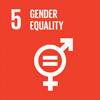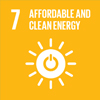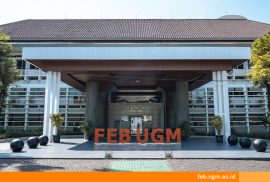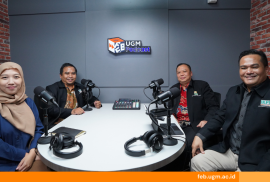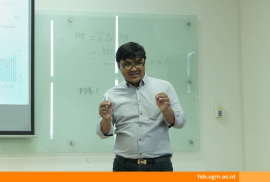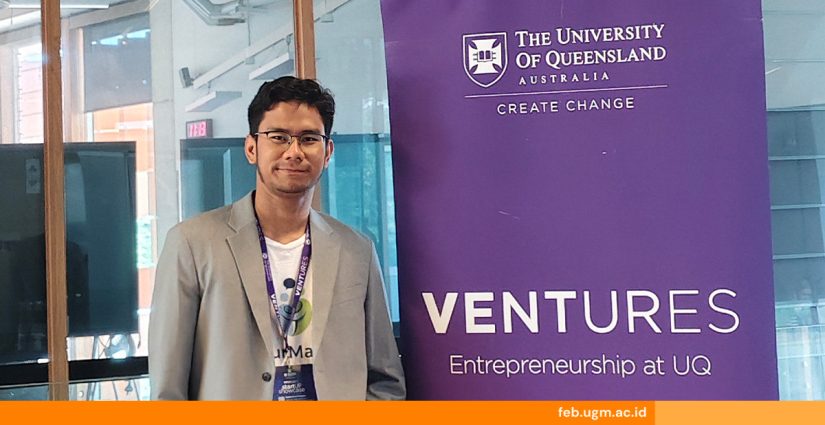
Not everyone dares to step out of their comfort zone to pursue a new calling. Fajar Munichputranto, a student of the Master of Management Program at FEB UGM and recipient of the LPDP Scholarship, chose to take that leap. From a career in banking to leading a renewable energy company, he is now pursuing a double degree program at The University of Queensland to deepen his knowledge in management and sustainability.
A graduate of Agricultural Industrial Technology from IPB University, Fajar began his career in the banking industry and advanced professionally over six years. However, amid his work routine, he felt a growing desire to make a greater impact on society and the environment. That opportunity came when he decided to join his family business in the waste-to-energy sector, focusing on converting organic waste into renewable energy.
As Deputy Director at PT Cipta Visi Sinar Kencana, Fajar is responsible for project planning and technical design involving various multinational companies. Through this experience, he realized that waste management is not only about technology and infrastructure, but also about business strategy and public awareness.
This realization became a turning point in his career. Fajar decided to pursue a deeper understanding of management through the International MBA Program at FEB UGM in 2023, under a double-degree scheme. According to him, this program is the right choice to broaden both local and global perspectives while developing a sustainable business approach.
“I also want to learn how other countries manage waste while seeking approaches that I can apply in Indonesia,” he explained when contacted while still undertaking his double degree program at The University of Queensland.
Fajar’s journey did not stop there. His desire to learn and contribute further to Indonesia led him to earn the prestigious and highly competitive LPDP Scholarship. However, the road was not easy. He admitted feeling nervous during the selection process, especially since he did not yet have a Letter of Acceptance at the time of the interview. Writing the essay was also a challenge, as he had to define his goals and contributions to Indonesia clearly.
“I raised the issue of waste management because I am directly involved in the waste-to-energy business. I want to bring new insights into public education and consumer behavior regarding waste segregation,” he said.
He also shared tips for LPDP applicants pursuing double-degree programs that focus on issues relevant to Indonesia’s context.
“Study a topic that reflects Indonesia’s unique challenges from a global perspective. The second tip is to be patient, because a double degree program is long and demanding. The process isn’t as quick as a regular program, but the results are gratifying,” he concluded.
His six years of experience in the banking industry also proved to be a valuable asset. He is grateful that his previous work trained him to communicate efficiently, as he was often required to deliver concise reports.
“This habit trained me to answer questions in a structured and meaningful way during the LPDP interview. The panelists can immediately tell whether our answers are convincing or not. So, being able to convey ideas clearly and sharply is crucial,” he explained.
When asked why he chose the University of Queensland (UQ) as his destination for a double degree, he stated that the university has a strong research focus on consumer behavior. It aligns perfectly with his interest in changing consumer behavior in waste management.
“At this university, every business idea is developed through clear stages from ideation, validation, and pitching, to achieving early revenue. The entrepreneurial spirit here is powerful. UQ also has a highly active entrepreneurship ecosystem through UQ Ventures, and I’ve joined that community,” he said.
For Fajar, FEB UGM has played a significant role in shaping his mindset. The values of integrity, professionalism, and equality serve as his guiding principles in both his professional and academic life. His experience studying abroad through the double degree program has also taught him to appreciate diversity, especially in intercultural discussions, leading to comprehensive and high-quality outcomes.
Report by: Shofi Hawa Anjani
Editor: Kurnia Ekaptiningrum
Sustainable Development Goals

